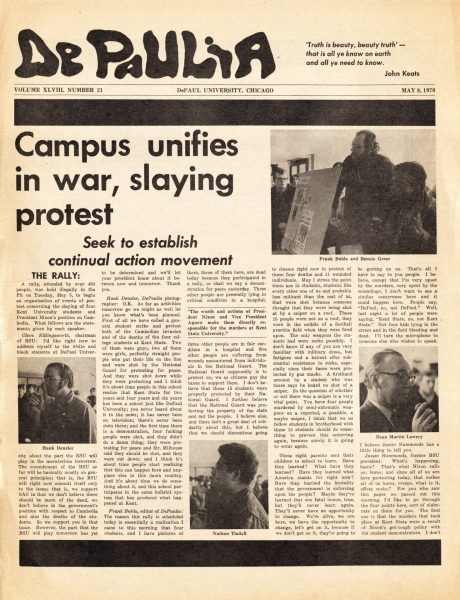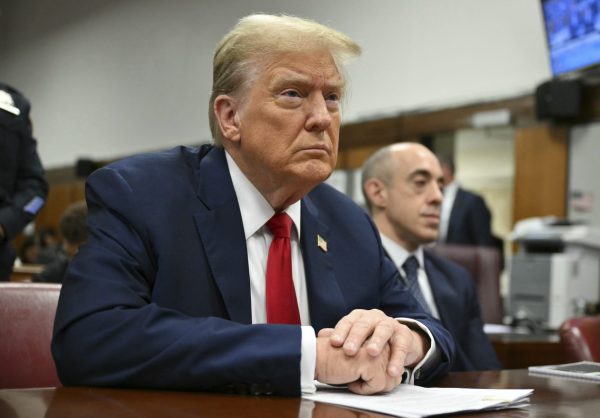Task force addresses student need for health insurance
In the time that DePaul didn’t offer a student health insurance plan, Joanna Buscemi, an assistant professor of psychology, watched one of her students at DePaul work tirelessly to complete her doctorate by 26-years-old. If started immediately after graduate school, a doctorate is typically completed by 27 or 28. However, Buscemi’s student had diabetes and needed coverage for insulin. In the United States in most cases, you can no longer be on your parents’ insurance once you turn 26.
In this student’s case, that would have meant a few years without coverage for insulin if she were not able to graduate early, get into the workforce and get access to health insurance. On average, insulin costs $6,000 per year if uninsured.
This is not the case for individuals at every school. Nearby colleges such as the University of Illinois-Chicago, Loyola University, Northwestern University and the University of Chicago all offer opt-in health insurance to their students. DePaul offered coverage as well until 2014. An estimated 71 percent of four-year private non-profit colleges in the United States offer student health insurance.
However, as of January this year, a group of DePaul students, faculty and staff assembled a task force to look into whether a student health insurance plan is a necessity at DePaul. The goal of the group is to gather data to “make a recommendation to senior leadership by the end of the academic year,” according to Eugene Zdziarski, DePaul’s vice president of student affairs, who leads the task force.
DePaul stopped its insurance in 2014 when the Affordable Care Act was passed under the Obama administration, according to Zdziarski.
The Affordable Care Act (ACA) was passed in March 2010 which required all US citizens to enroll in a health insurance plan. As a result, a survey “found that residents who earned up to $30,150 ($61,500 for a family of four) and were eligible for the ACA’s most generous subsidies spent about 17 percent less annually on health care costs.”
At the time of DePaul discontinuing their insurance plan, the healthcare marketplace became more affordable than opting into the university’s insurance plan.
Eligibility changed in January 2019 when it was “no longer mandatory at the federal level” to have health insurance coverage.
In 2014, the average annual premium, or amount paid upfront for health insurance, was about $6,025 for a single person plan. As of 2021, that number had risen to an estimated $7,739.
“Premiums were really high because people weren’t enrolling in the program,” Buscemi said about the premiums for DePaul’s previous health insurance offering for students.
Graduate students, who are no longer covered under their parent’s coverage, are among the most affected. In the submission to nominate herself to join the task force, Buscemi described how she has personally watched graduate students suffer physically, mentally and academically due to being uninsured.
“I’ve watched a student fall behind in coursework and research because she got into a car accident that involved injuries that she could not afford to get treated,” she toldThe DePaulia.
Himali Bhandari serves as a representative for graduate students on the task force.
“As a grad student I am already very stressed and busy and the fact that I don’t have reliable insurance is a hindrance,” she said.
Bhandari is also part of a graduate student association that conducted a survey among graduate students that found “substantial data” in support of student health insurance. When asked for the findings of this survey, Bhandari said that she was not able to share the information.
Beyond graduate students, Buscemi believes the “undergraduate need has increased.”
As of 2018, 7.9 percent of college students are uninsured. The survey showed Hispanic and Black college students are among the most affected, with 14.8 percent of Hispanic students and 11.5 percent of Black students being uninsured.
Bhandari and Buscemi headed up a survey sent to a sample size of DePaul students to assess the overall need for student health insurance that was sent out on April 20. They did not reveal how many students were sent the survey or responded.
The survey found that nine percent of DePaul’s students are uninsured. Of these students, 54 percent had been uninsured for over a year.
Danaka Katovich, the national co-director of Code Pink who graduated in 2018, was one of many affected by the lack of student health insurance during her time at DePaul. Katovich is from California and did not have access to her health insurance in Chicago.
“I have prescription medications and would have to go all the way home to see my doctor to fill my prescriptions,” Katovich said. “I could only pick it up there also, so I would have to see if I could get three months’ worth until I was able to go home again and pick up more.”
Katovich said it would have made her time at DePaul much easier for the university to provide coverage.
“I was working around the healthcare system, the healthcare system was not working for me,” Katovich said. “I mean think about how many out-of-state students DePaul has. I know I was not a rare case.”
Katovich’s experience with being underinsured has inspired her activism regarding universal healthcare and organized “Medicare for Mike” last year. She organized neighbors from Lakeview and Lincoln Park to call on Mike Quigley, the representative for Illinois’ 5th congressional district which includes Lincoln Park, to cosponsor Medicare for All.
“We sat outside of his office for three weeks every day,” Katovich said.
They were ultimately successful in making Quigley the 114th cosponsor of the bill on March 26, 2021 according to a statement on Quigley’s website.
The task force has not concluded a price for students to purchase health insurance at DePaul yet. Students are looking at paying $2,000-5,000 annually on an opt-in basis based on the task force’s research on other universities’ programs, according to Zdziarski.
Compared to nearby universities, Loyola University’s student health insurance costs $3,190 annually, Northwestern University’s program costs $4,386 annually and University of Chicago’s costs $4,566 during the 2021-22 academic year.
The task force is continuing its work through the end of the quarter to make its recommendation by the end of the academic year.











